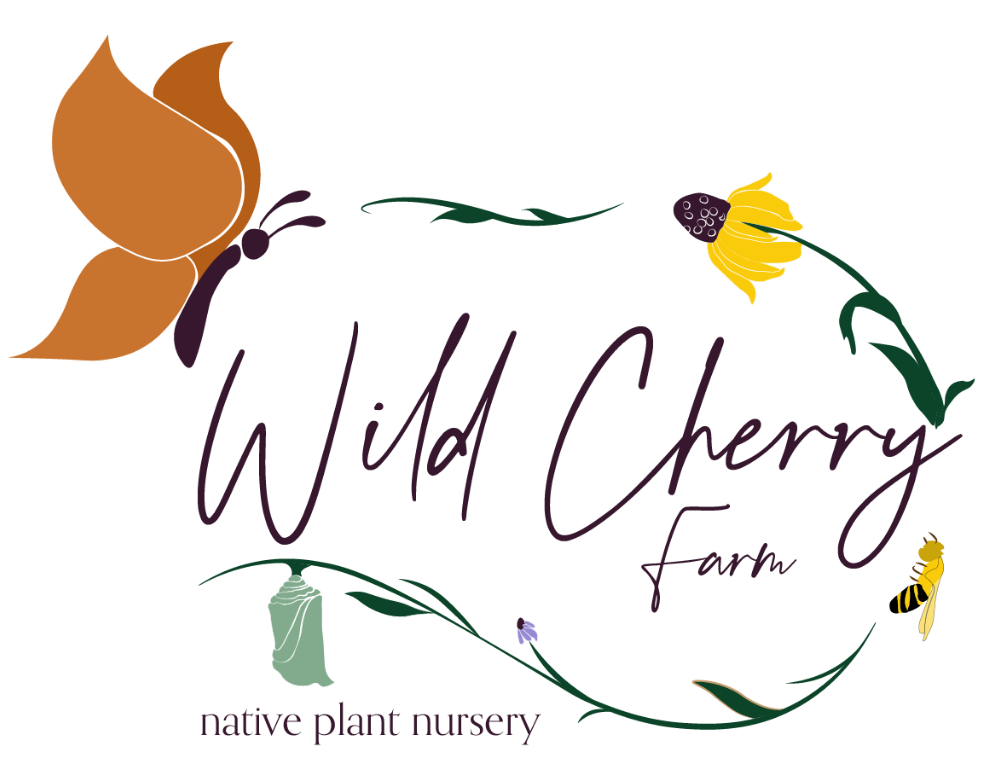Saw-Tooth Sunflower (Helianthus grosseserratus)
Saw-Tooth Sunflower is quite the pollinator powerhouse! Its flowers attract many native bees, butterflies, and moths. It is the host plant to 77 species of butterflies and moths in our area (nwf.org), including the threatened Gorgone Checkerspot (mnfi.anr.msu.edu). Saw-Tooth Sunflower is recommended as a monarch nectar source by the Xerces Society (Xerces.org) and it is a host plant to a whopping 55 different specialist bees (Johnson and Colla, 2023). The seeds are a favorite food of many birds, including many kinds of sparrows, Mourning Doves, American Goldfinch, and more (illinoiswildflower.info). Like most sunflowers, this plant is rhizomatous and can be aggressive in the landscape and not suitable for small gardens, so choose your planting spot carefully.
Photo credit: Frank Mayfield
Saw-Tooth Sunflower is quite the pollinator powerhouse! Its flowers attract many native bees, butterflies, and moths. It is the host plant to 77 species of butterflies and moths in our area (nwf.org), including the threatened Gorgone Checkerspot (mnfi.anr.msu.edu). Saw-Tooth Sunflower is recommended as a monarch nectar source by the Xerces Society (Xerces.org) and it is a host plant to a whopping 55 different specialist bees (Johnson and Colla, 2023). The seeds are a favorite food of many birds, including many kinds of sparrows, Mourning Doves, American Goldfinch, and more (illinoiswildflower.info). Like most sunflowers, this plant is rhizomatous and can be aggressive in the landscape and not suitable for small gardens, so choose your planting spot carefully.
Photo credit: Frank Mayfield
Saw-Tooth Sunflower is quite the pollinator powerhouse! Its flowers attract many native bees, butterflies, and moths. It is the host plant to 77 species of butterflies and moths in our area (nwf.org), including the threatened Gorgone Checkerspot (mnfi.anr.msu.edu). Saw-Tooth Sunflower is recommended as a monarch nectar source by the Xerces Society (Xerces.org) and it is a host plant to a whopping 55 different specialist bees (Johnson and Colla, 2023). The seeds are a favorite food of many birds, including many kinds of sparrows, Mourning Doves, American Goldfinch, and more (illinoiswildflower.info). Like most sunflowers, this plant is rhizomatous and can be aggressive in the landscape and not suitable for small gardens, so choose your planting spot carefully.
Photo credit: Frank Mayfield
Life Cycle: Perennial
Sun Exposure: Full-Partial, but prefers full
Soil Moisture: Medium-wet, Medium, Medium-dry
Height: 3-8 feet
Plant Spacing:
Bloom Time: August-October
Bloom Color: Yellow
Advantages: Deer Resistant, Bird Favorite, Caterpillar Favorite, Pollinator Favorite
Host: 77 species of butterflies and moths use this as a caterpillar host plant in our area (nwf.org)
Specialist Bee: Andrena accepta, A. aliciae, A. chromotricha, A. haynesi, A. helianthin, Calliopsis coloradensis, Perdita albipennis, P. bequaerti, P. swenki, P. tridentata, Pseudopanurgus albiearsis, Pseudopanurgus helianthin, Pseudopanurgus labrosiformis, Pseudopanurgus labrosus, Pseudopanurgus rugosus, Pseudopanurgus simulans, Pseudopanurgus solidaginis, Diadasia enavata, Melissodes agilis, M. bidentis, M. boltoniae, M. coloradensis, M. confuses, M. coreopsis, M. denticulatus, M. dentiventris, M. druriellus, M. gelidus, M. illatus, M. microstictus, M. niveus, M. rivalis, M. semilupinus, M. subagilis, M. tinctus, M. trinodis, M. vernoniae, M. wheeleri, Svastra obliqua, S. petulca, Colletes americanus, C. rufocinctus, Dieunomia heteropod, D. nevadensis, D. triangulifera, Dufourea marginata, Trachusa zebrata, Megochile fortis, M. parallela, M. pugnata, M. inimical, M. xylocopoides, Osmia subaustralis, Hesperapis carinata and Paranthdium jugatorium (Johnson and Colla, 2023)
Beneficial for Endangered or Threatened Species: Gorgone checkerspot (mnfi.anr.msu.edu)
Resource: Johnson, Lorraine, and Sheila Colla. A Northern Gardener’s Guide to Native Plants and Pollinators: Creating Habitat in the Northeast, Great Lakes, and Upper Midwest. Island Press, 2023








